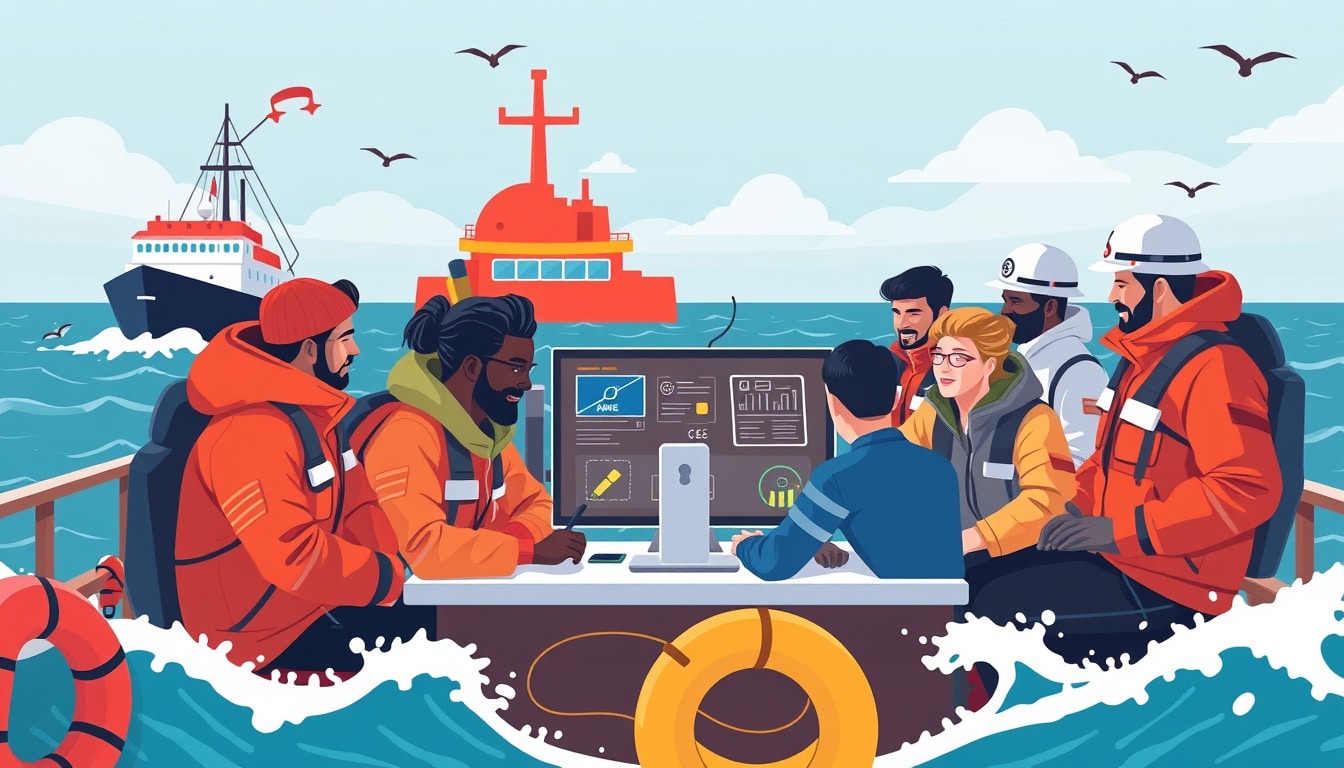As the maritime industry continues to evolve, the need for effective security measures has never been more critical. The Port Facility Security Officer (PFSO) and the Maritime Security Officer (MFSO) play essential roles in ensuring the safety and security of maritime operations. With advancements in technology and the ongoing demand for flexible learning options, many professionals are opting for online courses to enhance their skills. In this article, we will explore why choosing an online PFSO/MFSO course for your maritime security training is beneficial, particularly with offerings from recognized providers like the Virtual Maritime Academy, a DNV Certified Maritime Training Provider.
Learn More about our PFSO/MFSO Course!
Key Takeaways
- Understanding the roles of Port Facility Security Officers (PFSO) and Maritime Facility Security Officers (MFSO) is crucial for effective maritime security.
- Online maritime security training offers flexibility and convenience, allowing for self-paced learning tailored to individual schedules.
- Key features of online PFSO/MFSO courses often include interactive modules, real-time assessments, and access to expert instructors.
- Choosing the right online course involves evaluating course accreditation, content relevance, and available support resources.
- Investing in online PFSO/MFSO training enhances career opportunities and complies with international maritime security regulations.
Understanding PFSO and MFSO Roles
In the world of maritime security, understanding the roles and responsibilities of a Port Facility Security Officer (PFSO) and a Maritime Facility Security Officer (MFSO) is crucial for ensuring compliance with international regulations and maintaining safety at sea. The PFSO is tasked with developing security plans, conducting risk assessments, and implementing security measures at port facilities, while the MFSO oversees security protocols specific to vessels. Given the evolving landscape of maritime threats, professionals keen on enhancing their credentials often ask, ‘Why choose an online PFSO/MFSO course for your maritime security training?’ An online course not only offers flexibility to learn at your own pace but also provides access to expert instructors and comprehensive resources. At Virtual Maritime Academy, we pride ourselves on being a DNV Certified Maritime Training Provider, meaning our courses, including the PFSO Course, are recognized for their quality and adherence to industry standards. This certification guarantees that you will receive training that is both relevant and respected, enabling you to effectively manage security measures in compliance with ISPS Code requirements.
Benefits of Online Maritime Security Training
In today’s digital age, the maritime industry is evolving, and so are the training methods for professionals aiming to enhance their maritime security skills. Choosing an online PFSO/MFSO course for your maritime security training comes with numerous benefits that cater to modern professionals. Firstly, flexibility is one of the most significant advantages; online courses allow you to study at your convenience without the constraints of geographical location or rigid schedules. This means that you can effectively manage your time, balancing work commitments with your educational pursuits. Secondly, enrolling in an online PFSO/MFSO course provides access to comprehensive and up-to-date materials that are crucial in the ever-changing maritime landscape. Programs like the one offered by Virtual Maritime Academy, a DNV Certified Maritime Training Provider, are designed to meet industry standards while delivering practical insights. Additionally, the online format often fosters a global perspective, allowing you to interact and network with maritime professionals from various regions and backgrounds. Lastly, with the added assurance of DNV Certification for the PFSO Course, you gain credibility and recognition within the industry, ensuring that your skills meet international standards and enhancing your career prospects. In a field where security is paramount, upgrading your skills through a structured yet adaptable online platform is undeniably a smart choice.
Learn More about our PFSO/MFSO Course!
Key Features of an Online PFSO/MFSO Course
In today’s ever-evolving maritime industry, the demand for robust security measures is non-negotiable; hence the importance of effective training cannot be overstated. Why choose an online PFSO/MFSO course for your maritime security training? Opting for an online course offers numerous advantages, particularly with programs like those offered by the Virtual Maritime Academy, a leading DNV Certified Maritime Training Provider. One significant feature is the flexibility that online learning provides. Trainees can access course materials at their own pace and convenience, making it easier to fit their education into busy schedules. Moreover, interactive modules enhance engagement, making complex topics like risk assessment, incident reporting, and security management more digestible. Additionally, as the PFSO Course is DNV Certified, participants gain access to a globally recognized standard of training, ensuring that they receive quality education that aligns with international safety and security protocols. Online courses also often feature up-to-date content, reflecting the latest trends and regulations in maritime security, which can be critical for those working in a fast-paced environment. Ultimately, choosing an online PFSO/MFSO course not only empowers individuals with essential skills but also positions them as competent professionals in an increasingly vital field.
How to Choose the Right Online Course
When it comes to maritime security, the importance of proper training cannot be overstated. For individuals looking to enhance their credentials in the maritime industry, online courses offer a flexible and effective way to gain essential knowledge and skills. So, why choose an online PFSO/MFSO course for your maritime security training? First and foremost, online courses, such as those offered by the Virtual Maritime Academy, provide access to DNV certified training, ensuring that you receive high-quality, industry-recognized education. The convenience of learning at your own pace allows you to balance professional commitments while still advancing your career. Moreover, online platforms often include updated materials and resources that reflect current industry standards and regulations, making it easier for you to stay informed. Additionally, with the increasing demand for qualified Port Facility Security Officers (PFSOs) and Maritime Facility Security Officers (MFSOs), completing a certified online course can significantly improve your employability and professional standing. With the added assurance of DNV certification from the Virtual Maritime Academy, choosing an online PFSO/MFSO course could be a crucial step in your maritime career development.






